

Civil engineer for the Osaka Prefectural Government,
Sponsored by the Osaka-Utsubo Rotary Club
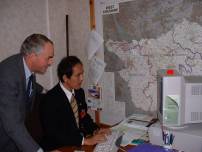
On one of my vocational study trips
Introduction
Our GSE team spent about five weeks (Sept. 13 through Oct. 17, 2002) in the
northwestern part of England visiting R.I. D-1050 in and around the city of
Manchester and its suburbs. Before my trip to England, I had envisioned England
as being a rather genteel place (I'm displaying my ignorance here!). As the
day of my departure was drawing close, I learned some things about the government
and history of England. For example, the official name of the country is the
United Kingdom of Great Britain and Northern Ireland, and it is made up of England,
Wales, Scotland, and Northern Ireland. Prior to this, I had been calling England
by the name we use in Japan for the country (Igirisu, instead of Ingurando),
which is not correct. From that time on, I referred to the country as England.
I work as a civil engineer for the Osaka Prefectural government, and I am presently
assigned to the Road Environment Division. My main work involves carrying out
studies to determine the direction road maintenance management should take in
the future. Getting to go to England, which has a very mature and developed
society and social "capital," was a golden opportunity for me to acquire
some hints and tips that would help me in my work, and I left for England greedily
looking forward to what I could learn. Also, because the GSE program is more
than just a vocational study trip, I had the privilege of staying at the homes
of a number of people and getting to see the facilities and programs of the
English Rotarians. I was able to get not just a superficial knowledge of the
way they work, but I had the chance to learn about the background behind the
things they are doing. I would now like to share with you some of the invaluable
experiences I had during my time in England.
Preparing to Go to England
Before leaving for England, I realized that being able to communicate with the people I met in England would be important, so I attended an English conversation school for four months. I didn't have the opportunity to use any English at my job that was related to the English I would be using when talking to English public servants, and I needed to arouse and resuscitate the English ability that had lain dormant in the recesses of my brain since I graduated from university. After four months, I was able to achieve a level of fluency that I felt would enable me to get by in daily conversation, and I left for England. One unexpected benefit of improving my English was that my five-year-old daughter (she was four years old at the time) was motivated to begin going to English conversation classes herself after seeing me struggling hard to learn English.
Also, since it was decided that we would be giving presentations about Japan
at all of the Rotary Clubs we visited in Manchester, the GSE team met together
a number of times before we left. With the guidance of our team leader, which
was based upon his wealth of experience, each of us wrote and practiced what
we would say in the 20 minutes that was going to be allotted to us. Despite
the fact that the five of us didn't know each other and we all had different
personalities, we hit it off right away and were able to develop a friendly
relationship before we left for England, and the nervousness we felt as we faced
our one-month study time in England diminished considerably.
The Topography of England
England (and London) is about the same latitude as Sakhalin Island. Compared
to Japan, its latitude is higher, and one would think that it would be colder
than Japan, but it was relatively warm, I thought, probably due to the effects
of warm sea currents off the western coast of England. The temperature was about
20 degrees C. during our stay in September. However, even though it was September,
it felt much cooler than it does in Japan at this time (Osaka is about 30 degrees
and more humid), and we all wore long-sleeve shirts from the moment we arrived
in England. Our host families, however, all wore short-sleeve shirts. At night,
when we were cold and asked them to turn on the heating, they always said with
astonishment, "Why? It's only September!" I reflected on the fact
that we Japanese do not adjust our bodies to the temperature around us, but,
rather, are too accustomed to energy-consuming equipment (like air conditioners)
to make us feel comfortable.
The time difference between England and Japan is 9 hours (8 hours in the summer).
So, when I called Japan from England for my "Good night" call, I was
greeted with "Good morning!" My young daughter was most confused by
this. Also, because of the fact that I would often talk late with my host families
or get home late from Rotary meetings, my calling time was quite late and the
9-hour time difference resulted in my phone calls being a bother and it was
hard for me to hear my children's quiet voices.
Because England is not located along ocean floor plates as Japan is, there
are almost no earthquakes there. However, while we were there, an earthquake
occurred which made the headlines. It was a small quake to us. Nothing at all,
actually, but it was on the front page of the British newspapers, and I learned
that in England they call earthquakes "tremors." It made me think
deeply about the fact that Japan really is a land of earthquakes.
About Manchester
Manchester is the cradle of British industry, and I had imagined that it would
contain many old rows of houses. In 2002, though, the Commonwealth Games were
held there, and, as a result, the city had been working on regenerating and
reviving the stagnant, depressed old sections of the city in preparation for
the Games. When I saw the nice, new row homes with Japanese cars driving on
the left side of the street, it made me feel like I was in Japan. These days,
there are calls for regenerating and reviving downtown Osaka, and I felt that
it is very important to create an atmosphere that will be a good match between
the old, existing structures and the newly developed ones by carefully considering,
"What is of value when it comes to renovating the city and in what ways
can we add value to the city?"

Downtown Manchester
Manchester is the third largest city in England, behind London and Birmingham,
and it is the second or third most important inland city in England. In Japan,
we have the three largest metropolises (Tokyo, Osaka and Nagoya) located at
the mouths of rivers that flow into the sea. In England though, with its gently
rolling landscape, being located along the canal network was of great importance.
Birmingham and Manchester are located north of London on the waterways. There
are a number of waterways located outside these cities as well, and when we
were driving around the outskirts of Manchester, we would often cross these
canals. It was these canals that contributed to making these cities large and
prosperous because during the Industrial Revolution, merchandise was transported
mainly along these waterways. (In Japan, when we think of canals, we think of
waterways that connect estuaries, but in England they are waterways that connect
cities.) Today, most shipping of goods takes place by truck instead of canal,
and they are used mainly today as recreation spots and for cruising in narrow
boats. Also, all along the canal system you can find locks for adjusting the
level of the water (these locks are not like the large locks that were once
found along the Yodogawa River in Osaka, but are small, man-powered locks).
My host family told me, "Due to the gently rolling landscape in the area,
one needs to pass through quite a large number of locks when traveling from
Manchester to London, and a person had to be very strong to do it." In
addition, when there is a very large difference in height between the canals,
lifts (like elevators for boats) are needed to move the boats along. Since I
had mentioned in my self-introduction that my hobby was sightseeing along rivers,
my host family kindly took me to see a refurbished lift. This tourist site features
the oldest lift in England, the Anderton Lift.
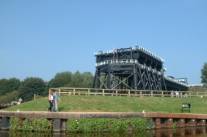
Anderton Lift

Give Way road sign
The British Temperament, As I Saw It During My Homestays
Support and politeness: the basis of British manners
In England, one can find road signs such as this one placed just before you
come to intersections. I was able to get a glimpse of the "consideration
and kindness" of the British when I saw these signs, and I realized that
we Japanese tend to forget the concept of "yielding to others" when
we drive. The English people offered me hospitality from the heart, and I felt
that such hospitality is indeed necessary. Also, I was moved by the way I saw
couples relating to each other and respecting one another, and it caused me
to reflect on my own marriage and how I treat my wife.
Also, love among family members is quite evident. Photographs of the various
family members can be seen decorating every room, and when asked about my own
family, my hosts would say, "Lovely," when I talked about my family.
(By the way, I received a large number of souvenirs for my children from my
host families, the result being that my bags were overweight at the airport
and had narrowly escaped from paying quite a bit extra for my luggage.)
Every one of our host families worked hard to make our time at their home enjoyable,
but we also noticed that they themselves found it natural to enjoy their lives.
We were able to see one facet of the rich and full life of the British people.
Cherishing nature
I let myself be the beneficiary of the "Give Way" mindset of consideration
and kindness that was shown to me by my host families. This way of thinking,
though, was not limited to people. I also felt that it was turned toward nature
as well. At every home I stayed, I found that my hosts were very serious about
gardening. In Japan, because we have a warm, rainy climate, it is possible for
flowers to grow and bloom without much care at all, but with its northern latitude
(50-55 degrees), it is impossible to have a flower-filled garden without giving
your garden a lot of loving care. Because of this, I was able to see how important
nature is to the British, how they love and cherish it. I felt that Japanese
civil engineers, to whom economic considerations reign supreme, have much to
learn from the British.

My host familyユs garden
Cherishing the old and loving the new
Through my homestay experiences, I felt that the British people give great importance
to tradition and history, but they are also keen to try to understand new developments
as well. All my homestay families' homes were built in such a way as to have
their exterior harmonize with the surrounding scenery. All of them were constructed
of traditional brick (because they don't have earthquakes, for the insulating
effect, and the fact that the raw materials for bricks are readily available).
Inside the homes, however, I found that every home I stayed in had at least
one personal computer, and I felt that they were making use of high-tech items.
Also, it is said that the English like fish and chips, but I also had Italian
dishes such as vegetable pies and lasagna. They didn't just stick to foods and
dishes unique to England.
About my host families
I have many, many memories of my host families, and it isn't possible for me
to write about all the things I experienced. But I do want to express my gratitude
to each of my host families.
Host family #1: Thank you for teaching me "conversation is necessary,"
"always smile," and for helping me understand the fundamentals of
having good interaction between those of different cultures.
Host family #2: Thank you for teaching me that when an opportunity presents
itself, we should reach out and take it if we are to succeed in life, and that
we need to realize that we must entrust our lives to fate.
Host family #3: Thank you for teaching me how to enjoy life, for taking me
to a jazz club and for being my golf caddy even though you are retired.
Host family #4: Thank you for taking me to see the lake district, and for helping
me to truly feel the richness and abundance of England's natural beauty.
Host family #5: Thank you for teaching me the importance of relating warmly
to one's family members. I really felt the love and warmth of each of the four
people in your family.
Host family #6: Thank you for instructing me on various cultural and work-related
topics, such as Edward Elgar and the Private Finance Initiative.
Host family #7: You also graduated from university as a civil engineer, and
you treated me as my boss. Thank you for teaching me that technological progress
is a mutual world asset.
Vocational Study
England's administrative system
London, the capital of England consists of 32 boroughs (London Borough) and
the City. There is no administrative agency overseeing all of these different
entities, making it a single-layer administrative system. The metropolitan districts
(Manchester, Birmingham, etc.) are also single-layer systems. Greater Manchester,
where I visited, is also without an overseeing agency, with the 10 metropolitan
borough councils governing themselves (unlike Osaka Prefecture, which is a middle
level governing body).
The non-metropolitan districts, though, are two-layer systems, and the district
I visited, Cheshire County, is a middle-level governing body that has control
over a number of borough councils.
There is an extremely small number of local autonomies in Great Britain (354,
ave. population 141,000). (Sweden, by the way has only 289, but the average
population is 31,000.) On the other hand, France, with 36,779 local autonomies
(ave. population of 2,000) and Germany, with 13,584 local autonomies (ave. population
of 6,000) have a large number. Japan lies in between Great Britain and France/Germany
with 3,252 autonomous communities (ave. population 39,000). England is often
said to be an advanced nation when it comes to local autonomies, but this is
hard to understand, at least when looking at the statistics (which seem to indicate
that the central governmental authority is quite strong). But, even though the
number of local autonomies is low in England, the solidarity between these independent
local parishes is strong, and they continue to have their own local color. Here
in Japan, the merging of towns and villages throughout Japan is up for discussion,
but we should think about it from more than the standpoint of increasing efficiency
by reducing the number autonomies. We need to also take the current conditions
of grassroots autonomies and the way in which they should be governed into consideration
before making any revisions.
Road management system
There are three basic types of roads in England. They are national roads that
serve as main arteries, which are managed by the central government (the Environment,
Transportation and Regional Agencies manage the roads, but the Road Agency has
direct control over some roads), county roads that are managed by counties or
metropolitan borough councils, and parish roads that are managed by villages
and towns. According to the Road Law, administration supported by national subsidies
are divided as shown below.
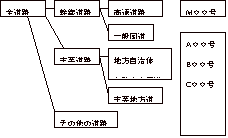
Road system in England)
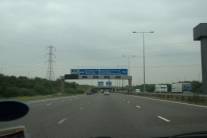
British expressway; it's FREE!
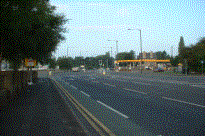
An A-class road
Maintenance years
In England, the main modes of transportation in the 1950s were buses, railways
and cars, but with the increase in motorization, the government began to construct
more and more roads, the result being that most people travel now by car.
From the 1960s, the government made road construction a top priority, constructing
most of the roads the nation needs, but today many of the older roads and bridges
are getting old and are in need of repairs. Today, road work is equally divided
between construction of new roads and repair and maintenance work on existing
roads. The way of thinking regarding repair work has changed from one of "leave
the roads alone until they are markedly in disrepair, and concentrate repair
efforts on those roads that are most seriously damaged" to one of "give
priority to those roads and structures that are of most importance and carry
out repair work on them as soon as they need it so that the useful life of the
road or structure can be extended." These days, very careful, detailed
maintenance management is being carried out in England.
(For your reference: If appropriate maintenance management is carried out, it
is possible to use iron bridges for more than 200 years. The bridge in photo
was constructed in 1779 and is the world's oldest iron bridge.)
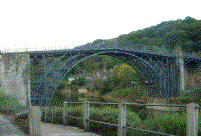
World's oldest iron bridge
In the next section, I would like to share with you some of the things I learned
about road maintenance management in England during my vocational study trips.
Strategic maintenance management
During my vocational study, I was able to visit several road bureaus. Under
the Blair administration, the "best value" policy is being promoted,
and England's strategic maintenance management approach can be summed up in
the phrase "delivering the best value in highway maintenance." The
overall strategy involved managing the inspections, record keeping, analysis
of present conditions, assigning priority rankings to the various repair projects,
the creation of a maintenance plan, etc., the putting together of a systematized
road facility asset management system, and having the local autonomies to implement
the system.
Each local autonomy has been working, based upon this "best value"
policy, to make use of this road maintenance system. They announce their 5-year
road plan budget (Every local autonomy is obligated to put together such 5-year
plans. They report how well they did in achieving the goals set by the central
government, and based on how well they did in achieving those goals, the next
year's grants are determined.) to the public, and I was deeply impressed by
what I learned. I also felt very keenly that Japan is a good 5 or 6 years behind
England when it comes to road maintenance management. Each local autonomy in
England is faced with managing a large, expanding amount of maintenance work.
I am interested in how they are going about calculating future operating budgets
and I was able to learn something about that process during my vocational study.
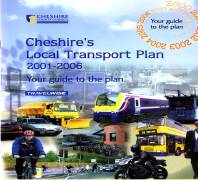
![]()
![]()
5-year plan and budget for Cheshire
This process begins with inspections that are carried out by professional inspectors
(technical public servants) belonging to the local autonomies' bureau of roads.
When current conditions are clearly understood, the total costs are considered
for each project with a 50-year maintenance period in mind. The damage is assessed
and a judgment is made regarding whether it would be best to replace the road
or bridge, etc. or to carry out careful repair work at regular intervals to
extend its useful life. A computer is then used to calculate the money that
will be needed to carry out the necessary bridge or paving work.
They already have a computer system in operation (GIS system) that makes it
possible to get an accurate view of current road and bridge conditions on the
computer screen. They can instantly see which roads need repair work, the amount
of road traffic and the traffic accident statistics associated with those roads,
and which roads need to be improved. This information is used to prioritize
the road work projects. (And unlike Japan, they do not set a budget ceiling!)
I felt that we need to implement such a pioneering, IT-utilizing road maintenance
system here in Japan as soon as possible.
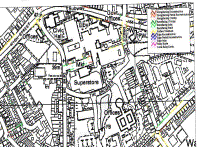
Computer screen showing which roads need to be improved
Such an approach is possible in England because they have already prepared/achieved
the following things:
*Data on the roads, bridges, etc. being maintained
*Inspection manual
*Improved skills of their workers in regard to carrying out the necessary inspections
*Road damage assessment manual
*Knowledge regarding the best timing for carrying out maintenance repair work
I had the feeling that it is best for such work to be carried out only after
those in charge get a grasp of the actual conditions of the roads, etc. in question.
In other words, there is a need to take a kind of clinical testing approach.
Also, the British are not just utilizing information technology when carrying
out their planning and strategy. They have also introduced a "plan-do-see"
approach that seeks to evaluate whether or not the repair plan goals have been
achieved, what percentage reduction in traffic accidents has been achieved,
etc. They are doing what they can to get a clear understanding of the outcome
of their plan and the work they carried out so they can objectively evaluate
it. Moreover, in order to effectively utilize their limited budget, they also
come up with a capital expenditure plan that considers things from an organizational
standpoint. They also consider the financial technology aspect of things and
utilize an asset management group within the civil engineering organizational
structure.
Here in Japan, we are also thinking of matters in a similar light, and I was
glad to be able to actually see it being put into practice and to get a clearer
glimpse of the future of maintenance management operations in Japan that are,
at present, rather unclear to us.
Various thoughts on England's roads
In a number of ways, England's roads are similar to those we have here in Japan,
but there are a number of things I consider noteworthy enough to mention in
my report. I think, as society is experiencing more and more globalization,
that it is important for us to put up our antenna and try to gather as much
information as we can from around the world that will help us solve the problems
we are facing.
・In England, they plant flowers around the base of their streetlights, and there
are many beautiful flowers along the roads.
・They do not put their trash outside along the road in plastic bags like we
do in Japan. Instead, everyone puts their trash in special trash boxes (they
all look alike), and the trash is never scattered all over the road and the
boxes even look nice!
・They are making good use of Woonerf (zigzags) and speed bumps to help keep
traffic slow along residential roads.
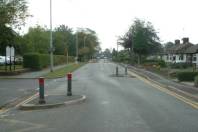
A road with Woonerf
・In order to ensure the safety of children who are walking to school, they
employ a school crossing patrol along those roads used by children.
・In order to restrict the amount of traffic in the inner city, the British are
making use of "park-and-ride" systems (commuters drive their cars
to special parking lots and take public transportation from there), trams (in
the suburbs they are normal train tracks and in the city the trains run on the
roads), and other approaches.
The importance of management
We tend to think of management when it comes to business operations as a means
of coming up with a way "to make the most profit." But in England,
the Bureau of Roads is managing and maintaining the roads based on the idea
of doing all they can to improve the lives of the citizens. It made me realize
that we must carry out our operations while constantly keep the following questions
in mind: "What condition is our work in right now, and what should it be?",
"What is our goal, what is the highest priority, and what should our goals
and priorities be?", "How can we best apportion our resources, such
as our budget and organizational assets?"
In Conclusion
In order for me to improve myself and my work, it is necessary for me to study
on my own and increase my potential, and to always keep my antenna up as high
as possible.
Through my vocational study trip to England and the cultural interchange I
experienced, I was able to gain many invaluable things that will benefit me
intellectually and as a human being. I could aim my antenna outward to the rest
of the world and pick up many things that were very meaningful that I will make
use of in my life from now on.
Thank you very, very much!